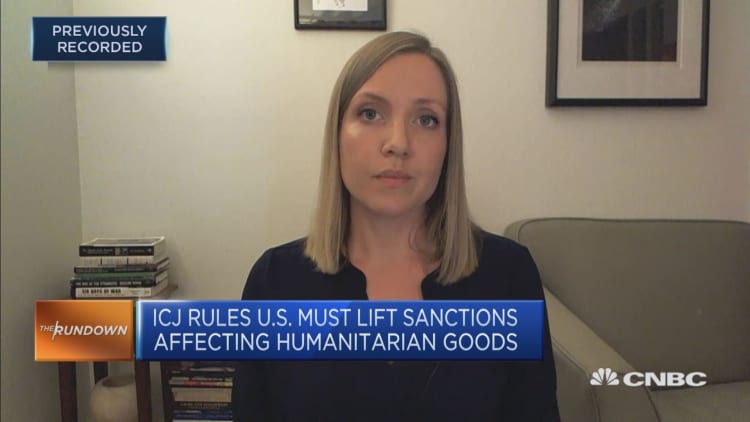The Donald Trump administration this week continued its vocal rejection of multilateral bodies after it withdrew from an International Court of Justice (ICJ) protocol and pulled out of a 1955 friendship treaty with Iran.
The moves were triggered by an ICJ ruling Wednesday that Washington must ensure its sanctions don't hit humanitarian aid or civil aviation safety for Iran — a ruling that is binding but cannot be enforced.
Top American officials chastised what they called Tehran's "abuse" of the international court, with National Security Advisor John Bolton announcing that the U.S. would abandon the "optional protocol" under the Vienna Convention on Diplomatic Relations, a 1961 international treaty outlining diplomatic relations between states.
The 1955 Treaty of Amity with Iran, meanwhile, signed between the Washington and the U.S.-backed Shah of Iran before he was overthrown in 1979, established friendly relations and the right to ICJ arbitration in case of disputes.
Throughout the last four decades, however, Iran and the U.S. have ignored each other's complaints brought to the ICJ, and both countries' policies toward one another have long violated the treaty.
'Politicized and ineffective'
Bolton accused the ICJ, the UN's Netherlands-based venue for settling international disputes, of being "politicized and ineffective."
The decision to withdraw will limit U.S. exposure to ICJ rulings, which will simultaneously restrict its own ability to bring cases against other countries. It was also in response to a complaint brought by Palestine in September against the Trump administration's decision to move the U.S. embassy in Israel from Tel Aviv to Jerusalem.
"This really has less to do with Iran and the Palestinians than with the continued consistent policy of the United States to reject the jurisdiction of the International Court of Justice, which we think is politicized and ineffective," Bolton said Thursday.
The current revival of U.S. sanctions on Iran stems from the Islamic Republic's continued testing of ballistic missiles, human rights abuses and military or proxy engagement in conflicts around the Middle East.
No actual impact on sanctions
The ICJ ruling is binding on the U.S. as a matter of international law. However, Roger Matthews, senior director at Dechert LLP's International Trade and EU Law practice, told CNBC: "If the U.S. simply disregards it, there is little that either Iran or the court can do to enforce it."
The U.S. withdrawal from its Treaty of Amity with Iran, and the State Department's response to the ruling, "confirm that the U.S. has no intention to respect it... the ruling will not have any impact on the U.S.' re-imposition of extra-territorial sanctions on Iran," Matthews said.
Washington has long sought to decrease its exposure to ICJ rulings, having already done so in the 1980s. This latest move highlights the administration's focus on sovereignty and its "America First" agenda, deepening worries among Western allies over Trump's disparagement of multilateral institutions that have prevailed since the end of World War II.
The past year has seen the president escalate his criticisms of NATO, the United Nations and the International Criminal Court, among others. The U.S. controversially withdrew from the UN's Human Rights Council in June, calling it biased and politicized.
'Existing exceptions' for humanitarian aid remain: Pompeo
Secretary of State Mike Pompeo told reporters Thursday that existing exceptions, meanwhile, protected Iran's access to humanitarian aid and aviation safety, without regard for ICJ proceedings. The court had ordered the US to remove "impediments" to exports of medicine, medical supplies, civil aviation equipment, and food and agricultural commodities to Iran.
"We're working closely with the Department of the Treasury to ensure that certain humanitarian-related transactions involving Iran can and will continue," he said.
During the wide-ranging multilateral sanctions imposed on Iran by the Obama administration from 2010 to 2015, the humanitarian and aviation sector exemptions remained intact.

Iran has sought to portray itself as a victim and a lone adherent to international agreements ever since the Trump administration's decision to withdraw from the 2015 nuclear deal, signed along with EU states, Russia and China, which lifted economic sanctions on Tehran in exchange for limits to its nuclear program. Iranian Foreign minister Javad Zarif on Wednesday tweeted that U.S. sanctions were hurting the Iranian people, calling it an "outlaw nation."
Washington's subsequent re-imposition of sanctions has contributed to the tanking of Iran's economy, which the World Bank now expects to contract by 3.6 percent in 2019. In November, following sanctions on numerous sectors in August, new sanctions will come down on the country's oil exports, which comprise 80 percent of its public revenue.
Its ICJ complaint aimed to produce a ruling that would demand a rollback of all the sanctions enacted after the nuclear deal withdrawal, but those efforts failed, leading Bolton to call the decision a "defeat for Iran."
One step closer to conflict?
Robert Malley, a former White House coordinator for the Middle East and lead White House negotiator of the Iran nuclear agreement, condemned the U.S. decision and its broader implications.
"Bolton again showed why the Trump administration is increasingly isolated on the world stage," Malley said. "He attacked respected international institutions like the International Court of Justice. He mocked our European allies and criticized their support for the JCPOA — a deal they want to preserve because they know it is working to prevent Iran from acquiring a nuclear weapon.
"This bellicosity undermines U.S. interests and, by escalating tensions and forfeiting diplomacy, risks putting us on a path towards conflict in the Middle East."
Risk analysis firms have warned of escalated conflict between the U.S. and Iran, although many experts believe that Tehran will continue to avoid outright military confrontation. Instead, it has been drawing on its arsenal of hybrid capabilities, including cyber attacks and its support of proxy groups fostering instability around the region like Lebanon-based Hezbollah and, to a growing degree, Houthi rebels in Yemen.


